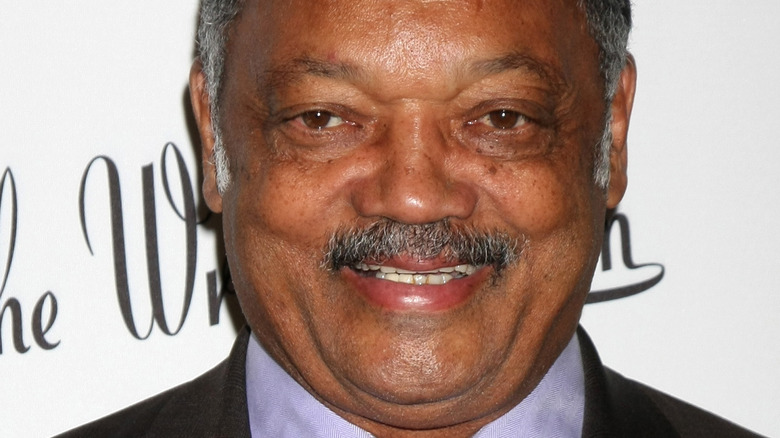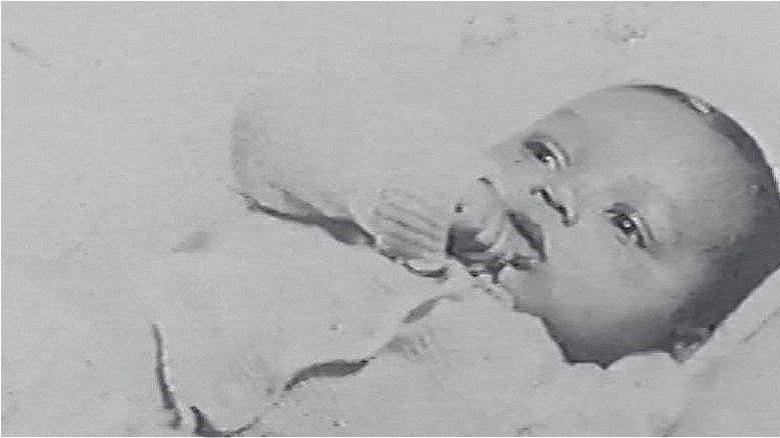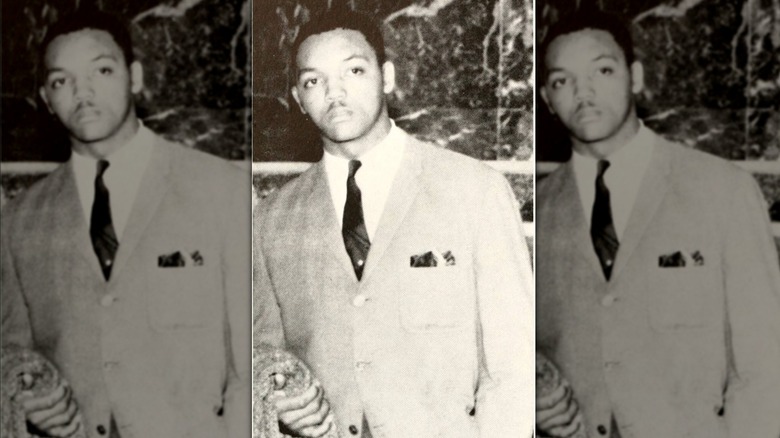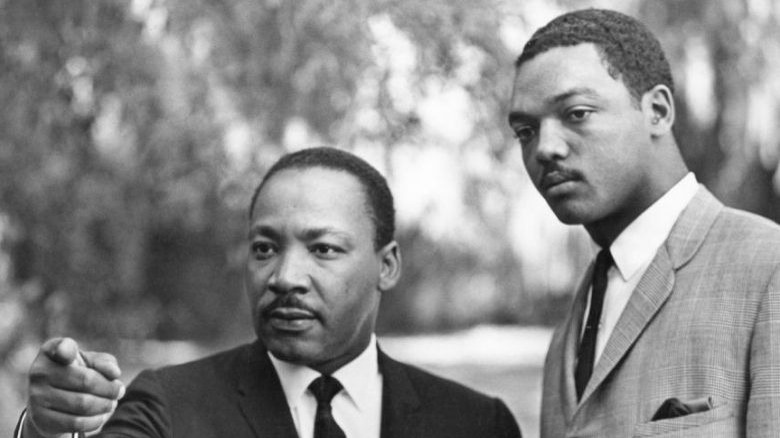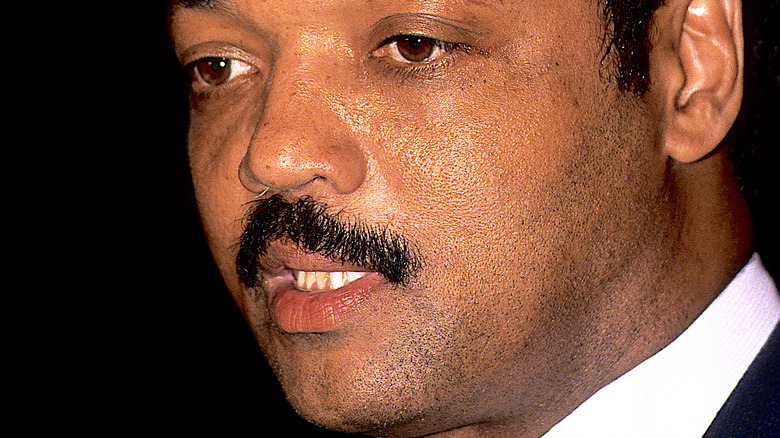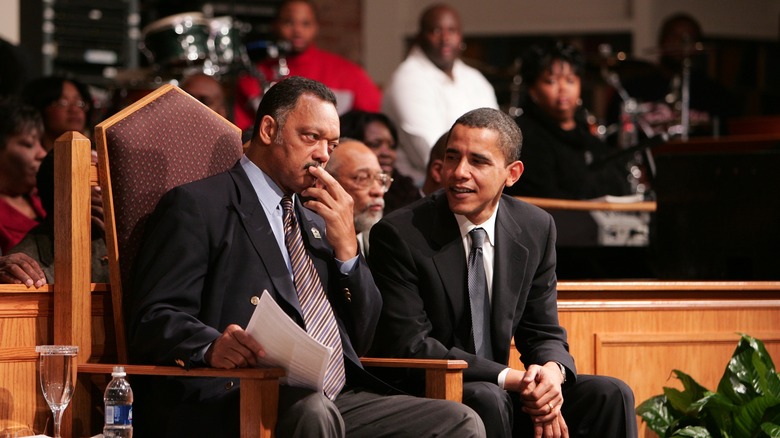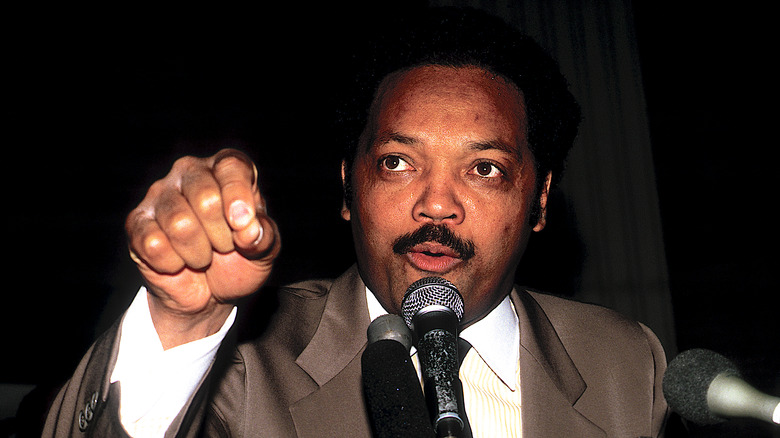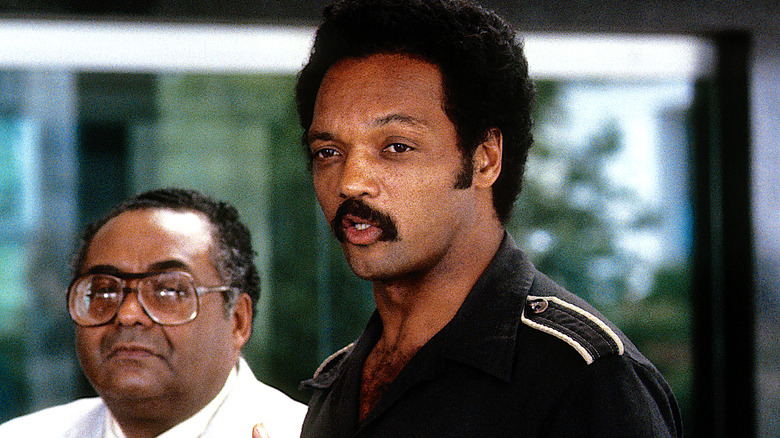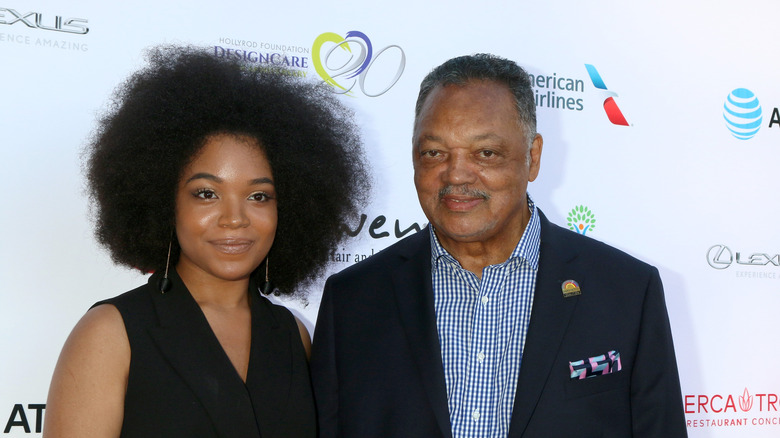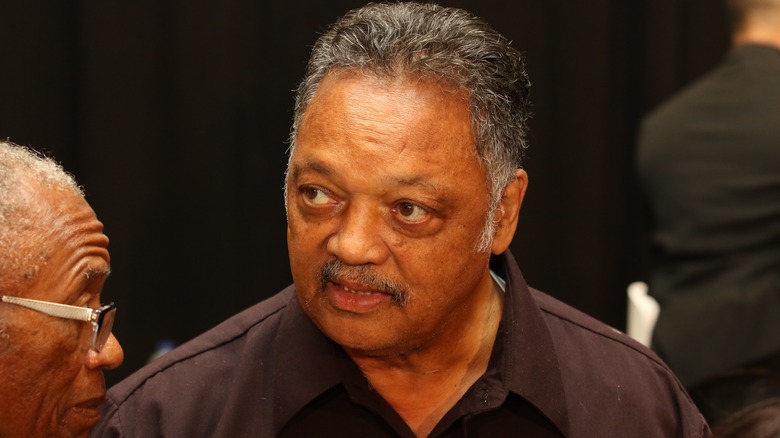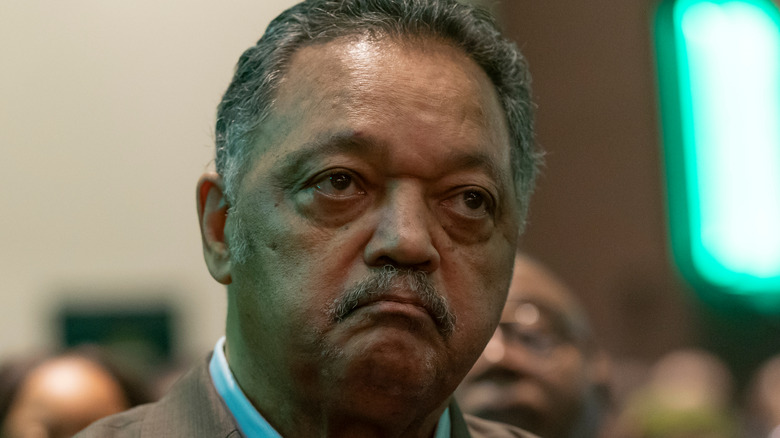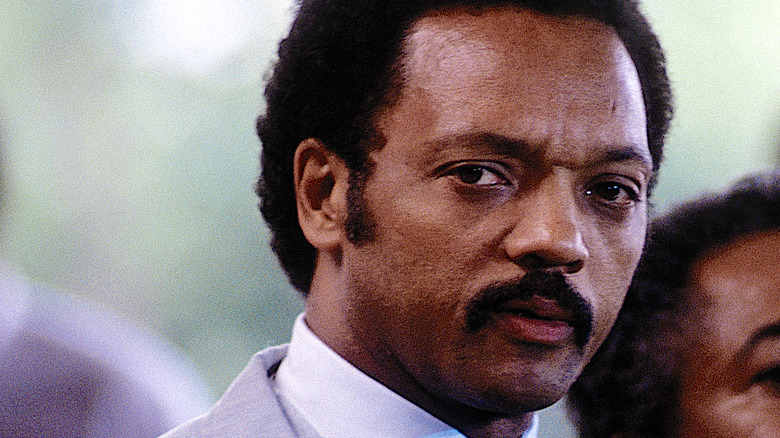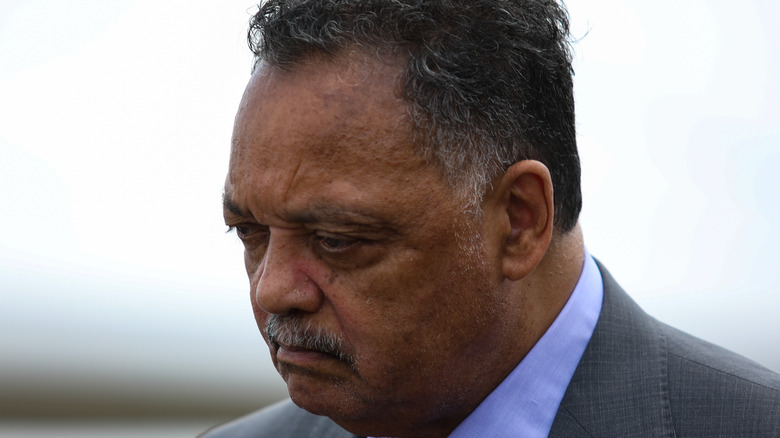The Tragic Real-Life Story Of Jesse Jackson
Civil rights leader, Baptist minister, and politician Jesse Jackson's life and legacy will forever be embedded into American culture. In his 80 years on this earth, Jackson has lived through segregation. He has led many successful sit-ins and protests for equal rights for African Americans — some of which led to arrest. He has run for president twice and became the strongest-ever Black candidate before Barack Obama took office in 2008. His influence as a candidate within the Democratic Party ensured that African American issues were at the forefront of the party's platform. In 1989, he was appointed "shadow senator" by the Washington City Council, which became his first elective office position. In 1997, President Bill Clinton named him a special envoy to Africa. Jackson traveled to the region to promote democracy, security, and human rights.
That same year, Jackson launched the Wall Street Project. According to its website, the organization aims to "end the multi-billion-dollar trade deficit with minority vendors and consumers." In 2000, Clinton awarded him the Presidential Medal of Freedom. In 2021, Jackson was awarded France's highest order of merit, the Legion of Honor. But despite his numerous accomplishments, he has courted many controversies. Jackson was criticized in the mid-'80s for using a racial slur to describe the Jewish community. He also had an adulterous affair with a staffer, resulting in a secret love child. There's one thing for sure — Jackson's life would make one hell of a biopic.
Jackson was born out of wedlock
Jesse Jackson was born in Greenville, South Carolina on October 8, 1941 to Helen Burns, a 16-year-old high school student, and Noah Louis Robinson, Burns' 33-year-old neighbor, who was married to another woman. Robinson was a wealthy and respected Black citizen in town who worked as a cotton buyer. Jackson, along with his mother and grandmother, struggled to make ends meet. The civil rights leader did not learn the truth about his biological father until he was "5 or 6" years old. In a 1987 interview with The New York Times, he said the discovery was "interesting, but it was not traumatic, because I was never fatherless or an orphan." When Jackson was 2, his mother married Charles Jackson.
According to History.com, Jackson lived with his maternal grandmother until he was around 13. He then returned to live with his mother and stepfather in 1957 and was adopted by Jackson. He has previously spoken about the taunts he received from other children about being born out of wedlock. Jackson told Graham Bensinger in an interview that his church-going mother had to apologize for his birth and place him on the altar for forgiveness. In a 1987 interview, Noah Robinson Jr. said that his half-brother's parentage fueled ”a subliminal longing for respect and recognition that he is somebody.”
Growing up in the segregated south
Growing up, Jesse Jackson lived under Jim Crow segregation laws and was taught to go to the back of the bus and use separate water fountains from white people. Jackson told The Christian Science Monitor in 1987: "I remember ... getting on the bus and wanting to sit near the driver and look out the front window ... and then my mother caught my arm and squeezed it and said, 'Lets go to the back.' ... It hurt her to have to make me leave.” Jackson attended Sterling High School and was elected president of his class, the honor society, and the student council. After finishing 10th in his class, Jackson earned a football scholarship to the University of Illinois in Chicago. The young Jackson was excited at the prospect of getting away from the racial climate in the South. But he was upset and angered to find both open and covert discrimination at his university and in other parts of the city.
After several semesters, Jackson decided to leave the University of Illinois, return to the South, and attend North Carolina Agricultural and Technical College (A&T.) Proving himself again on the pitch and with his peers, Jackson was voted student body president. It was during this time that Jackson's activism came to fruition. He encouraged his fellow students to protest against racial injustice by staging demonstrations and boycotts.
The Greenville Eight arrest
In January of 1960, a studious Jesse Jackson needed a book for a college assignment. But in the segregated Greenville County library system, Jackson could not find the book that he was looking for. Joan Mattison Daniel, who was a freshman at Morris Brown College in Atlanta at the time, told American Libraries: "The book was not at the colored branch library, a small, one-room house on East McBee Avenue." By the time the book would be available, it would be too late for him to complete his assignment. Jackson decided he would enter the whites-only library to obtain the book but was promptly told to leave. Months later, in July 1960, Jackson and seven other African American students went into the whites-only library and sat down in the reading room.
The librarian, Charles E. Stow, asked them to leave, but they silently stood their ground. The students were arrested and charged with disorderly conduct. African American attorney Donald J. Sampson had the eight students released on $30 bond. Sampson filed a lawsuit in U.S. District Court for the Western District of South Carolina. All the charges against the now-dubbed "Greenville Eight" were eventually dropped. However, instead of integrating, both the Black and white branches of the library were closed.
Jackson was present at Martin Luther King's assassination
In 1965, Jesse Jackson went to Selma, Alabama, to march with prominent civil rights leader Martin Luther King, Jr. Jackson looked up to King as a mentor and became a worker in King's Southern Christian Leadership Conference (SCLC). In April 1968, Jackson was in Memphis, Tennessee with King, who had come to the city to support a sanitation workers' strike. Jackson was on stage with King in the Mason Temple when he made his famous "mountaintop" speech. King talked about having premonitions of his untimely death. "It doesn't matter with me now," King concluded in his galvanizing speech. "Because I've been to the mountaintop ... And I've looked over. And I've seen the promised land."
On April 4, 1968, Jackson was with King at the Lorraine Motel in Memphis, Tennessee. The two were planning to go to dinner with a local pastor. According to Jackson, King turned to Ben Branch, a musician, and asked him to perform his favorite song at a rally later that night: "Make sure you play 'Take My Hand, Precious Lord.' Play it real pretty." Those were King's final words. Just moments later, he was shot and killed. Jackson was tasked with calling King's wife but found himself unable to relay the full gravity of the situation over the phone.
He allegedly mishandled charity funds
After Dr. King's assassination, many Black activists looked to Jesse Jackson as King's natural successor. This led to clashes with King's close friend and fellow civil rights activist, Ralph Abernathy. It was Abernathy who was King's crucial ally and most trusted friend – but it was Jackson who was holding the authority and popularity among his peers. In the spring of 1971, Abernathy ordered Jackson to move the national office of Operation Breadbasket — an organization dedicated to improving the economic conditions of Black communities — from Chicago to Atlanta. Jackson refused to move and forged ahead with his own ideas. In October 1971, Jackson set up the Black Expo in Chicago, a trade and business fair to promote Black capitalism. The five-day event was attended by Black businessmen from 40 states, as well as white politicians such as Cleveland Mayor Carl Stokes and Chicago Mayor Richard J. Daley.
After the success of the event, Abernathy questioned the handling of receipts — worth approximately $500,000 — from the Black Expo. He suspended Jackson as leader of Operation Breadbasket. It led to Jackson angrily resigning his position at the Southern Christian Leadership Conference. Al Sharpton, then youth group leader of the SCLC, also left the organization in protest of Jackson's treatment. Sharpton later formed the National Youth Movement. Jackson also had the majority backing of his entire Breadbasket staff — 30 of the 35 board members resigned from the SCLC and decided to set up a new organization.
Jesse Jackson ran for president twice ... and lost
In November 1983, Jesse Jackson announced his campaign for President of the United States in the 1984 election. He became the second African American (after Shirley Chisholm) to mount a nationwide campaign for president as a Democrat. In the Democratic primaries, Jackson was seen as having little chance at winning the nomination. But he surprised many when he took 3rd place. In May 1988, Jackson sought the Democratic presidential nomination again. Jackson once again exceeded expectations and doubled his support in some states. He came in 2nd in delegates, behind winner Michael Dukakis. However, he beat out future Vice President Al Gore and future Vice President and President Joe Biden. Jackson's 1988 campaign was hindered by his half-brother Noah Robinson Jr.'s criminal activity and eventual conviction. But many felt Jackson paved the way for the first African American commander-in-chief — Barack Obama.
In March 2007, Jackson declared his support for Obama in the 2008 Democratic primaries. He later criticized Obama that same year for "acting like he's white" in response to the Jena 6 beating case. On July 6, 2008, during an interview with Fox News, a microphone picked up Jackson whispering to fellow guest Reed Tuckson: "I want to cut his n*** out ... Barack, he is talking down to Black people." Jackson also criticized Obama's Father's Day speech blasting absentee Black fathers. Jackson later apologized and continued to support Obama's presidency.
Targeted by white supremacists
In 2002, Jesse Jackson was the target of a white supremacist terror plot. Couple Leo Felton and Erica Chase wanted to rid the United States of people of Asian, Black, Hispanic, and Jewish descent. Felton, whose mother is white and father is Black, drew up targets that included the United States Holocaust Museum. He also targeted movie director Steven Spielberg and Black leaders, such as Rev. Jesse Jackson and Al Sharpton. He was described as a "racial terrorist." Court documents reveal that Felton was hoping to ignite a race war that would bring about a new "all-white nation.”
But this wasn't the only death threat Jackson has faced. In a 2014 interview with Politico, when Jackson was 72, he was asked if he'd expected to live as long as he had, after his mentor Martin Luther King Jr. was assassinated at 39. "I did not," he admitted. He revealed that his run for president led to to 311 death threats – the most death threats of any candidate ever. "Once the 14th person had actually been arrested there came a point where my staff had to convene members of my family and I had to face my children face to face about the implications of operating on a journey so dangerous."
He supported Terri Schiavo's parents
Theresa Marie Schiavo was a woman who lived in an irreversible, persistent vegetative state after going into cardiac arrest in 1990 at the age of 26. Reports suggests the cause may have been an eating disorder. Schiavo suffered massive brain damage due to the lack of oxygen to her brain. Her husband Michael and her parents had opposing views on whether she should be kept alive. In early 2005, Jesse Jackson visited Schiavo's parents and supported their bid to stop her husband ending her life. Schiavo's parents, Robert and Mary Schindler, invited Jackson to join their vigil after seeing him on television questioning the removal of their daughter's feeding tube. Schiavo's husband had the tube withdrawn, five years after winning a state judge's permission to do so.
Jackson said he called members of the Florida Senate and wanted to find a way to save Schiavo's life. He prayed with the Schindler family and asked for more time from the courts. "Unless we are anxious for her to die, we must not be this callous about human life," Jackson said. The Schiavo case attracted worldwide attention. The life-or-death decision was debated up to the level of then-President George W. Bush. But after an intense and challenging seven-year legal battle, Schiavo's feeding tube was ultimately removed. She died at a Pinellas Park hospice on March 31, 2005.
The mistress and love child scandal
Jesse Jackson married author and activist Jacqueline Lavinia Davis on December 31, 1962, and they had five children together. In 2001, it was revealed in the National Enquirer that Jackson had a four-year affair with a member of his staff, Karin Stanford. The secret romance resulted in the birth of daughter Ashley in May 1999. In an interview with Connie Chung in 2006, Stanford said she was not concerned by Jackson having a wife, because she thought it was a "political marriage." Stanford says she first met Jackson when she was completing her doctoral dissertation on his foreign policy record. Shortly afterwards, Jackson offered her a job working at his organization. Stanford confessed to being his mistress, saying she knew they probably would never be together openly. "He didn't make any promises," she revealed. "I didn't think we'd have a future together."
Adding to the scandal, it emerged that Jackson's Rainbow/PUSH Coalition charity gave Stanford $15,000 in moving expenses and $21,000 in payment for contracting work. Jackson was also paying $4,000 a month in child support. Jackson issued a statement saying, in part, "I fully accept responsibility and I am truly sorry for my actions." He also revealed that he would temporarily step away from public life "to reconnect with [his] family." Jackson seems to have taken an active role in Ashley's life. He was seen with rap mogul Diddy at her high school graduation and on various red carpets together.
His Parkinson's diagnosis
In 2017, Jesse Jackson announced that he had been diagnosed with Parkinson's disease. The civil rights leader revealed that he first noticed symptoms "about three years ago." Jackson's biological father, Noah Lewis Robinson, died aged 88 from a heart attack and complications from Parkinson's disease. "After a battery of tests, my physicians identified the issue as Parkinson's disease, a disease that bested my father," Jackson said in a statement. Symptoms of Parkinson's include tremors in the body and slurred speech. The disease also afflicted the late boxer Muhammed Ali and "Back to the Future" star Michael J. Fox. Around 60,000 new Parkinson's diagnoses are made every year in the United States, and there is currently no known cure.
Jackson has received outpatient treatment at Northwestern Medicine in Chicago. Exercise is said to be very effective for patients who have Parkinson's. Jackson reportedly has to undergo daily physical therapy, in addition to "occupational and speech therapy," according to AP.
Jesse Jackson was hospitalized with COVID-19
In August 2021, Jesse Jackson and his wife Jacqueline were hospitalized with COVID-19 at Northwestern Memorial Hospital in Chicago. Jackson was vaccinated against the virus, but at the time, his wife was not. Jackson family spokesman Frank Watkins insinuated that many people of color were "skeptical and suspicious" about the vaccine. Jacqueline spent time in the ICU during her treatment, though her family confirmed that she was never placed on a ventilator. She was released from the hospital in September 2021. Jackson became fully vaccinated in January 2021, receiving two doses of the Pfizer vaccine, the first of which occurred during a publicized event urging vaccine-hesitant citizens to get the jab.
Jackson was released from Northwestern about a week after his COVID symptoms began. He was transferred to a rehab facility. He has campaigned for President Joe Biden to release 60 million AstraZeneca vaccine doses for India, which is in the grip of the coronavirus pandemic. "They are human beings. As the wind blows, if we don't stop it today, it'll spread around the world," he said.
Rodney King was a close friend
On March 3, 1991, Rodney King was seen in a grainy videotape being mercilessly beaten by police officers. The African American motorist's savage assault at the hands of four white officers sparked the L.A. riots, after they were acquitted of all charges. Jesse Jackson befriended King in the wake of the brutal video. He told CBS Chicago that King was "haunted by tragedy." On June 17, 2012, King's partner, Cynthia Kelley, found King dead at the bottom of his swimming pool. His autopsy results revealed that the father-of two died of accidental drowning, with alcohol and other drugs contributing factors. He was 47 and had just co-authored a book called "The Riot Within: My Journey from Rebellion to Redemption."
Jackson says he last spoke to King a month before he died. "It was a joyous conversation about his book. He said he ... was broke, and he was on the road to recovery." In 2016, Jackson spoke to The Marshall Project about King's legacy. "Rodney King is in the lineage of Emmett Till, Medgar Evers, Trayvon Martin — that lineage of violation. What's different today is, the camera has brought it to light."
Health issues in 2021
In 2021, Jesse Jackson was admitted to the hospital several times. On January 29, Jackson was said to be experiencing severe "abdominal discomfort" and was admitted to Northwestern Memorial Hospital. It was later revealed that he had undergone gallbladder surgery. His second and third hospitalizations came after he contracted COVID-19 in August. He was then moved to a rehab facility for physical therapy due to his Parkinson's disease.
Then in November, the civil rights pioneer was hospitalized after falling and hitting his head at Howard University. Students at the historically black college complained about their living conditions on campus. Jackson was seen attending a meeting with Howard President Wayne A.I. Frederick and members of the student body. They described how mold, flooding, and crumbling buildings were interfering with their education. The students organized sit-ins and slept in tents in protest of their treatment. Jackson attempted to diffuse the situation with students and the Howard administration.
After falling, Jackson dusted himself off and continued to discuss the matter at hand. However, after seeking medical attention, he underwent a standard CT scan and other routine tests at Howard University Hospital. These all came back normal — but Jackson was kept overnight as a precaution.

